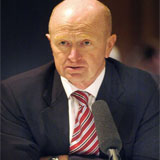Central banker warns Australians of higher interest rates
 Sydney - Stimulus spending will need to be curbed and interest rates rise as the economy quickens after the mildest downturn in recent times, Reserve Bank of Australia governor Glenn Stevens said Monday.
Sydney - Stimulus spending will need to be curbed and interest rates rise as the economy quickens after the mildest downturn in recent times, Reserve Bank of Australia governor Glenn Stevens said Monday.
"In due course, both fiscal and monetary support will have to be unwound as private demand increases," Stevens told a parliamentary committee.
Prime Minister Kevin Rudd said a year ago that Australians were in for their worst recession since the Great Depression of 1930s.
His prognosis proved way off the mark: the economy has not even managed a recession let alone a depression. No major financial institution has closed its doors and the jobless rate is unlikely to rearch the 8.5 per cent Rudd was predicting a year ago.
Stevens said the downturn had proved to be milder than that in mid-1970s, the early 1980s and in the early 1990s and was a world away from the United States, Japan and Europe where economies had gone backwards quarter after quarter.
"People are realizing that although things are tough, the worst has not occurred and the future is looking brighter," he said. "We're in recovery."
He warned companies and individuals to prepare for the withdrawal of the fiscal and monetary measures taken to shore up aggregate demand and keep the economy out of recession.
Stevens said the country had gone into the global financial crisis without government debt and riding high on a mining boom powered by demand from China.
Rudd had responded with stimulus spending of 42 billion Australian dollars (36 billion US dollars) - one of the biggest packages relative to population in the developed world.
The central bank had done its bit by reducing interest rates by 4.25 per cent between September 2008 and April 2009. Rates, independently set by the central bank, are now at a 49-year low of 3 per cent.
Stevens said interest rates "can be expected, at some point, to move off their current unusually low levels, as recovery proceeds."
Tightening monetary policy would hurt mortgage holders and perhaps crimp the rate of recovery. But interest rate hikes would help guard against inflation breaking out above the bank's target ceiling of 3 per cent. dpa